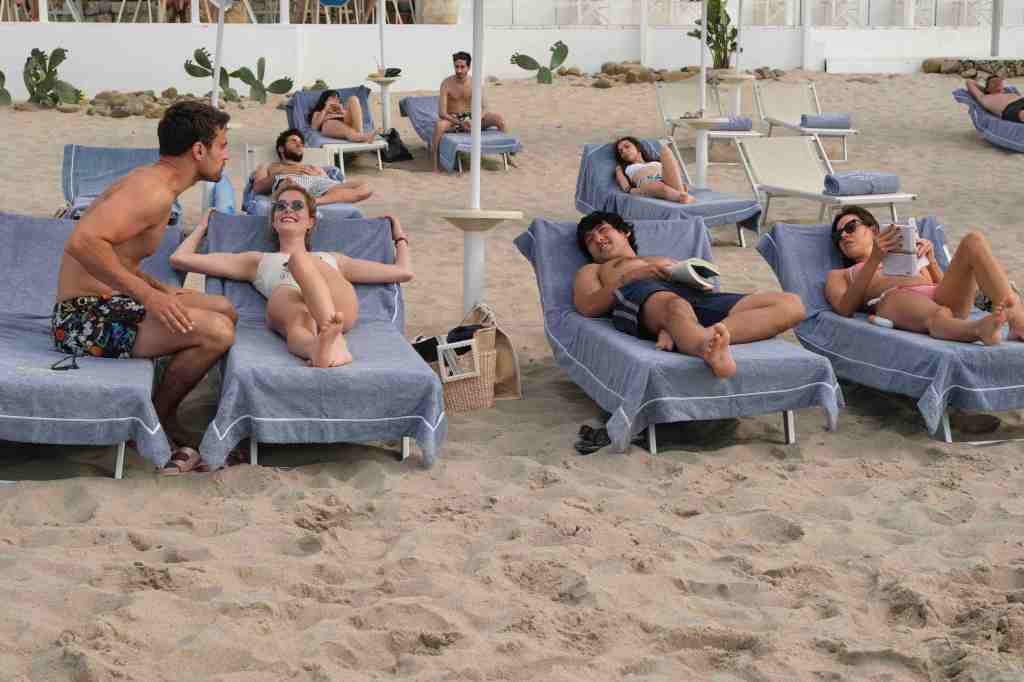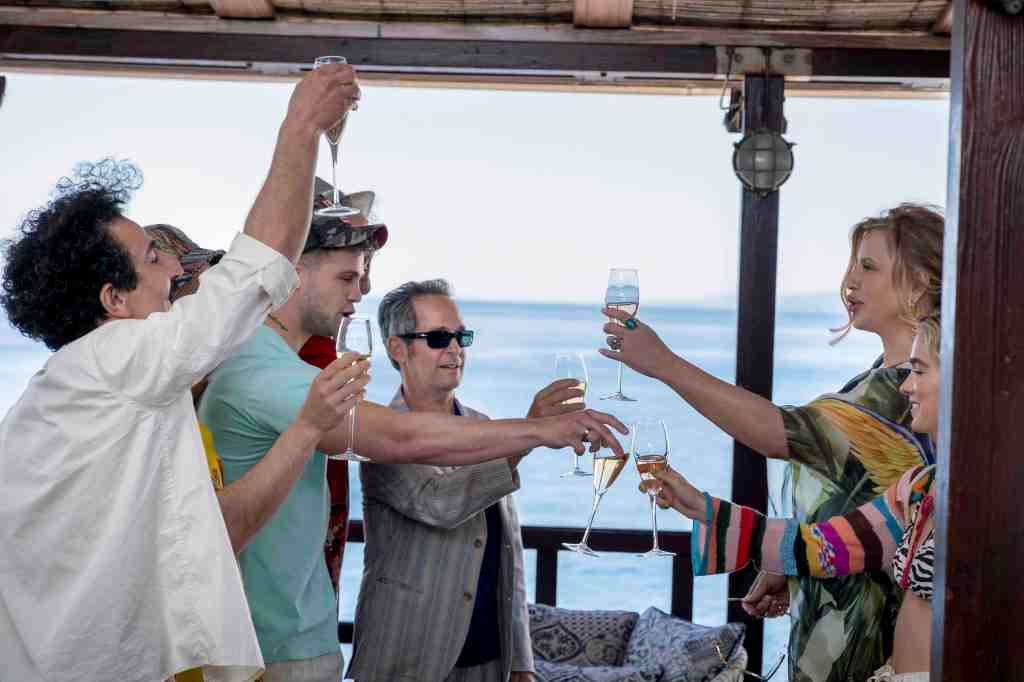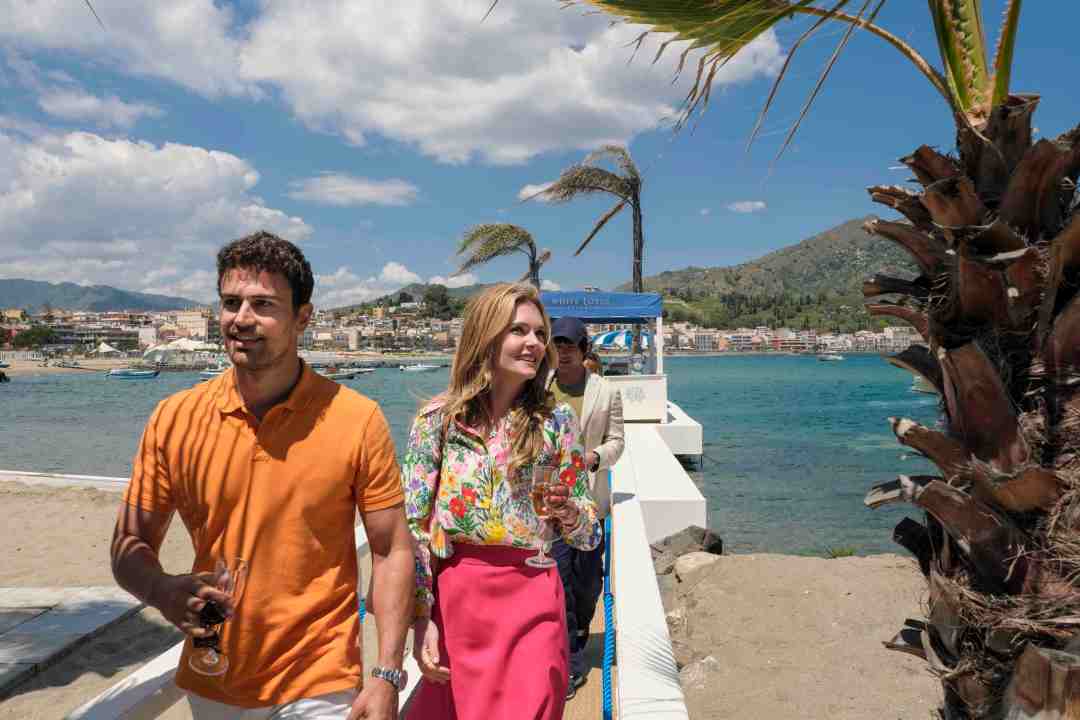Glamorous love-to-hate-them characters, beautiful scenery, money, sex and murderous intent: it’s not hard to see why The White Lotus has been such a success on both sides of the Atlantic. Each series of the darkly comic satire (available on Sky Atlantic and Now TV) charts a week in the lives of the wealthy guests and employees at a sumptuous five-star resort – first in Hawaii, then in Sicily. This week’s season two finale drew record viewing figures in the US, and a third series has already been commissioned.
But while The White Lotus may be full of unexpected twists, its choice of setting is less surprising. From Agatha Christie’s Death on the Nile, Evil Under the Sun and Murder on the Orient Express to recent books-turned-TV hits such as Liane Moriarty’s Nine Perfect Strangers and T.M. Logan’s The Holiday, writers and filmmakers seem to find sunny backdrops an irresistible location for dark tales. So why are luxurious holiday destinations such a popular – and effective – setting for murder mysteries?
As the author of several thrillers set in high-end holiday resorts, I know from experience why these settings work so well. The first ingredient is mystery: in a holiday destination, far from home, no one knows who you are. And that means it’s easy to pretend to be someone you’re not, should you want to. You have a group of disparate people thrown together in close proximity. Everyone has let their guard down. In a luxurious setting where everything is done for you, it’s easy to forget that normal rules still apply. Some people might be criminals who want to steal from you or hurt you. You just don’t know.
Set against private plunge pools, personal butlers, Michelin-starred meals, duplex suites and beautiful scenery, the horror of what is happening is somehow both amplified and dissipated
Often these kinds of holiday destinations also have a claustrophobic element – in a luxury hotel or spa, many guests won’t stray too far from the ‘safety’ of the resort. Within its walls they’re protected from hagglers, with any signs of local poverty conveniently tucked out of the way, little chance of having to negotiate language barriers and helpful staff on hand should any difficulties arise.
But even with the assistance of hotel staff, it’s often harder to seek help when you are away from home. You’re an outsider: you don’t speak the language; you don’t know the local processes for reporting a crime. It’s also possible that hotels wouldn’t want to publicise a theft or a murder which happened on their property and could try to smooth things over without involving the authorities. All of these things might help a fictional criminal get away with their crimes – and give an author or screenwriter endless possibilities.
There’s also the potential imbalance between the lives of the staff and the holidaymakers they are serving with a smile no matter how obnoxious they might be – brilliantly portrayed by strung-out resort manager Armond in The White Lotus’s first series, and the doomed romance between guest Paula and Hawaiian hotel staffer Kai.
And then there’s the opportunity for escapism that means audiences lap up these settings – who wouldn’t want to think about warm seas and blue skies when there is snow and ice on the ground outside at home? And who doesn’t enjoy the schadenfreude of watching these privileged, often spoilt and sometimes unpleasant people getting their comeuppance in unexpected ways, such as Armond’s grim revenge on entitled and demanding honeymooning guest Shane in the first series?
Most of us simply don’t expect horrifying things to happen in beautiful and expensive places – and somehow the juxtaposition between the two is intriguing, fascinating and extremely watchable.

There’s also plenty of scope for accidents, sabotage and murder when a cast of characters are taking part in unfamiliar activities in unfamiliar places. Fictional murders are lent more glamour and intrigue when they take place somewhere exotic. (I first saw two on-screen characters almost crushed by a boulder falling in Abu Simbel in Death on the Nile several decades ago, and yet the image has stayed with me ever since.)
For all these reasons, my own thrillers are, like The White Lotus, based around murder in high-end holiday resorts. They variously feature sabotaged diving equipment, poisoned meals, arson, shooting accidents, deliberately damaged brakes and even someone being thrown in a macerator. But set against private plunge pools, personal butlers, Michelin-starred meals, duplex suites and beautiful scenery, the horror of what is happening is somehow both amplified and dissipated.
The Chalet, as the title suggests, is set in a luxurious chalet in a resort where a man went missing 20 years earlier while skiing with two well-below-par ski guides. In resorts, not only are the guests transient, but many of the workers are too. Which is why what happened 20 years earlier might have stayed in the past, if only the dead man’s body hadn’t resurfaced. How are the those staying in the chalet now connected to what happened then?

My most recent book, The Cruise, was partly inspired by the ships moored off the south coast of England during Covid. My fictional ship is enormous but also top-end – it even has a revolving Michelin-starred restaurant. The action is largely set among a skeleton crew who are on board to keep an out-of-action ship ticking over, and it offers the same scope for mystery as most holiday resorts – people who have come from all over the world, don’t know each other and so can easily keep their secrets hidden.
And the book I’m working on is set in an ultra-luxe over-water island in the Maldives which in many ways is as self-contained and isolated as a cruise ship. With beautiful settings, luxurious rooms and just-so service contrasting with potentially dangerous activities and a few people who are not quite who they say they are, all the ingredients are there. Having watched The White Lotus, I’d recommend the guests don’t leave their suitcases open.







Comments